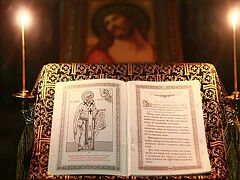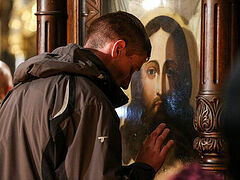The essence of Great Lent, which lasts six weeks and which leads us to Passion Week and to the Feast of Feasts, Pascha, can best be characterized as “sweet sorrow.” During this time period, which is sorrowful and at the same time exalted, the image of man’s sinfulness, his estrangement from God, appears especially clearly before him, and there sounds out a call to repentance, a call to what overcomes that barrier that man had erected between himself and God.
The Russian term pokayanie is a translation of the Greek concept of metanoia, which literally means “change of mind.” Great Lent calls us not to a fruitless self-condemnation, something capable of leading one to loss of faith in oneself or to pessimism and despondency. Rather, it calls man to return to the necessary path, the path which leads him back to his paternal home, to his true homeland.
Biblical revelation tells us quite clearly that man has a dual nature. According to the Russian poet Derzhavin, man “is at the same time king and slave,” and those two states are in never-ending conflict with one another. Dostoevsky expresses a similar idea: that satan is doing battle with God, and that the field of battle is the human soul.
According to Sacred Scripture, man is a temple, but it is a fallen temple, in need of cleansing and restoration. It bears the image of God, but that image has become clouded and in need of renewal by means of fasting and prayer.
In calling for repentance and for renewal of the heart, the Church of Christ also decisively rejects despondency, something it likens to spiritual death and a slander upon man.
Great Lent does not simply preach a call to repentance. At the same time, its message contains that Good News without which the very act of repentance would have no meaning. It proclaims the Good News that man is a child of God, by which God has forever united Himself with His creation.
Lent bears witness to man’s original nature, to his eternal closeness to God, a closeness that had been disturbed and weakened by sin, but that could not be destroyed.
At its very core, Great Lent is the Good News of the approaching Pascha. Thus, its sadness is merely the path toward the joy of the Resurrection.
In the opening days of Great Lent, the Great Canon is read. The Canon was composed in the eighth century by Andrew, Bishop of the Island of Crete. This excellent liturgical poem compares the state of the human soul with images from the Old Testament and attempts to awaken in man responsibility for his life, to help him see himself and assess himself in the light of eternity. This self-realization brings the believer not to despair, but to a new beginning—to renewal of the mind and heart. In this lies the power and beauty of Great Lent.
May the holy days of Great Lent be for all of us as days spent in a place of spiritual healing from which we might emerge better than we had been. May the Lord, Ruler of all, help us succeed.





